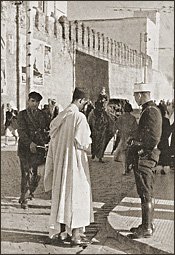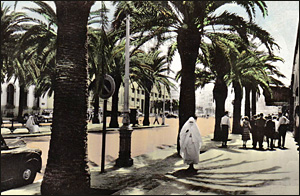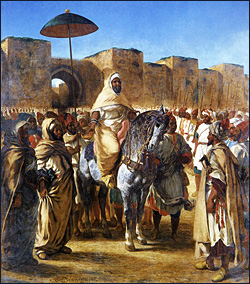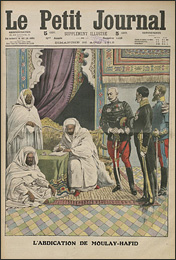Travel by Novel: Morocco
Best Historical Novels for Travelers to Morocco

Morocco has a far more interesting history than the relatively few historical novels available in English about the country might suggest. Phoenician traders arrived and settled on its shores by the sixth century B.C. Later, the country was known as Mauretania and was independent, ruled by Berber kings, until after the fall of its neighbor, Carthage, when Rome began to dominate parts of the country.
The first historical novels set in Mauretania portray the period when the Roman Emperor Augustus arranged the marriage of King Juba II with a daughter of Cleopatra, cementing an alliance with Rome. The Romans lost influence in the third century when Berber tribes began to reconquer parts of Mauretania. The Vandals conquered northern Africa, including Mauretania, in the fifth century; in the sixth, Belisarius and Justinian restored Roman rule; in the seventh, conquests by the Visigoths ended Roman control over all but a small outpost, conquered by the Berbers in the eighth century.

A series of Berber and Arabic dynasties ruled Morocco for centuries. Historical novels emerge again for the sixteenth and seventeenth centuries, when it was an Islamic nation ruled by sultans. European influence increased in the nineteenth century, and in 1912 the Treaty of Fez made Morocco a French protectorate.
The Tuareg tribes, nomadic horsemen often known as the "blue men" because of their indigo head-wraps, have captured more than one author's imagination. Native Moroccans long resented colonial rule, and the popular Sultan Mohammed V finally negotiated a return to independence during the 1950s. Political tensions in the 1960s did not prevent the newly independent country from becoming an exotic tourist destination for young Americans. Readers interested in Morocco are fortunate that several authors, undazzled by romance, have taken a serious literary approach to portraying the country and its people.
Jump to:
The Ancient Kingdom of Mauretania
The Era of the Sultans
Colonial Morocco
Post-Independence
The Twenty-First Century
The Ancient Kingdom of Mauretania
Click on the title for more information from Powell's Books or another online source.Wallace Breem, The Legate's Daughter
Stephanie Dray, Song of the Nile (2011), about Cleopatra's daughter Selene and her marriage to King Juba of Mauretania; sequel to Lily of the Nile. Revew at the Smart Bitches Trashy Books blog
The Era of the Sultans

Jane Johnson, The Sultan's Wife
Jane Johnson, Crossed Bones
Amin Maalouf, Leo Africanus (1986), about a sixteenth century Moroccan geographer and his travels through the Mediterranean world. Review at The Guardian
Colonial Morocco

Tahar ben Jelloun, The Sand Child (1985), about a Moroccan man in the early twentieth century who raises his eighth daughter as a boy so that she will be able to inherit his estate. Review at New Arab Review
Tahar ben Jelloun, The Sacred Night (1987), about a Moroccan woman raised as a boy and her search for her identity as a woman; sequel to The Sand Child; winner of the 1987 Prix Goncourt. Review at the Los Angeles Times
Paul Bowles, The Sheltering Sky (1949), about three American travelers adrift in North Africa after World War II; contemporary when written. Review at the New York Times
Linda Holeman, The Saffron Gate (2009) about an American woman who goes to Marrakesh in the 1930s in search of her missing lover. Review at the Historical Novel Society
Jean-Marie Le Clézio, Desert
Michael Pearce, A Dead Man in Tangier (2007), a mystery about a Scotland Yard inspector sent to Tangier on the eve of World War I to investigate the death of a Frenchman; #4 in the Seymour of Special Branch mystery series. Review at Mysterious Reviews
Post-Independence

Tahar ben Jelloun, The Last Friend (2004), about two young men who meet in Tangier in the 1950s and live through political turmoil and imprisonment. Review at The Observer
Esther Freud, Hideous Kinky (1992), about a five-year-old London girl whose hippie mother takes her and her sister to Marrakesh in 1972; a semi-autobiographical novel based on the author's childhood. Review at the Los Angeles Times
The Twenty-First Century
Click on the title for more information from Powell's Books or another online source.Laila Lalami, Hope and Other Dangerous Pursuits (2005), about a group of young Moroccans who try to cross to Spain on a lifeboat. Review at blogcritics.org
Lawrence Osborne, The Forgiven
Back to Travel by Novel Directory